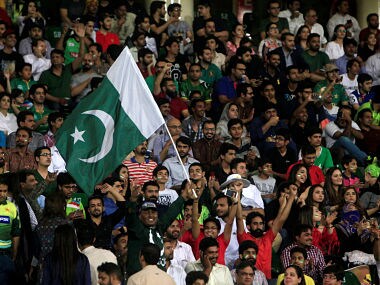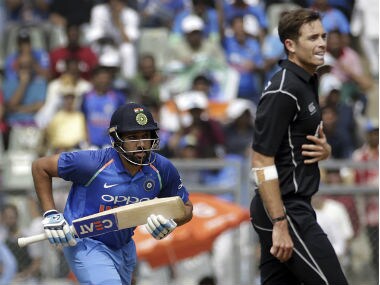- Pakistan and Sri Lanka in UAE, 3 T20 International Series, 2017 PAK Vs SL Pakistan beat Sri Lanka by 2 wickets
- Pakistan and Sri Lanka in UAE, 3 T20 International Series, 2017 PAK Vs SL Pakistan beat Sri Lanka by 7 wickets
- Bangladesh in South Africa, 2 T20 International Series, 2017 SA Vs BAN South Africa beat Bangladesh by 20 runs
- New Zealand in India, 3 ODI Series, 2017 IND Vs NZ India beat New Zealand by 6 wickets
- Pakistan and Sri Lanka in UAE, 5 ODI Series, 2017 PAK Vs SL Pakistan beat Sri Lanka by 9 wickets
- West Indies in Zimbabwe, 2 Test Series, 2017 ZIM vs WI - Oct 29th, 2017, 01:30 PM IST
- New Zealand in India, 3 ODI Series, 2017 IND vs NZ - Oct 29th, 2017, 01:30 PM IST
- Bangladesh in South Africa, 2 T20 International Series, 2017 SA vs BAN - Oct 29th, 2017, 06:00 PM IST
- Pakistan and Sri Lanka in UAE, 3 T20 International Series, 2017 PAK vs SL - Oct 29th, 2017, 06:30 PM IST
- New Zealand in India, 3 T20 International Series, 2017 IND vs NZ - Nov 1st, 2017, 07:00 PM IST
| Rank | Team | Points | Rating |
|---|---|---|---|
| 1 | India | 4493 | 125 |
| 2 | South Africa | 3767 | 111 |
| 3 | England | 4497 | 105 |
| 4 | New Zealand | 3114 | 97 |
| 5 | Australia | 3294 | 97 |
| Rank | Team | Points | Rating |
|---|---|---|---|
| 1 | South Africa | 6386 | 120 |
| 2 | India | 6217 | 120 |
| 3 | Australia | 5948 | 114 |
| 4 | England | 6156 | 114 |
| 5 | New Zealand | 5362 | 112 |
| Rank | Team | Points | Rating |
|---|---|---|---|
| 1 | New Zealand | 1625 | 125 |
| 2 | Pakistan | 2702 | 123 |
| 3 | West Indies | 2395 | 120 |
| 4 | England | 2029 | 119 |
| 5 | India | 2545 | 116 |





Lahore: Even Pakistan’s prime minister did not believe it could happen but when Sri Lanka visit the eastern city of Lahore on Sunday for a T20 match, the hosts will celebrate the end of eight years of isolation from international cricket.
Less than a year ago, none of this appeared possible for a nation that had largely been shunned by international teams since 2009 due to security risks.
That year gunmen attacked a bus carrying the Sri Lanka team from their hotel to Lahore’s Gaddafi stadium for a test match, injuring six players and killing six security personnel and two civilians.
The incident forced Pakistan to play their home matches in the United Arab Emirates and the country has since remained starved of international cricket at home, apart from Zimbabwe’s limited-overs tour in 2015.
File image of a spectator waving Pakistan's national flag of Pakistan during World XI series in Lahore. Reuters
Last year, the inaugural Pakistan Super League (PSL), based on the franchise model of the Indian Premier League and Australia’s Big Bash League, became a success though all the matches were played in the UAE.
Things changed in March this year when Pakistan hosted the final of its domestic T20 competition featuring high-profile international players.
“Even that baby step seemed an impossibility. I can tell you that none of the franchises wanted it, they were scared ... the government was scared...the players were scared,” Pakistan Cricket Board (PCB) chairman Najam Sethi told Reuters in an interview.
The match proved pivotal in changing the global cricket community’s opinion of Pakistan’s ability to host international matches and garnered support from cricket’s governing body, the International Cricket Council (ICC).
The months leading up to the final were filled with endless negotiations with the government, persuading domestic franchise owners and convincing players that security was under control.
“I had two meetings with the prime minister, I raised it with him, he heard me out, he didn’t give me an opinion, he said we will think about it closer to the event,” Sethi said.
As the match drew closer Sethi became desperate, sending then Prime Minister Nawaz Sharif numerous requests “from various quarters” in the hope that he would make a favourable announcement.
Sharif’s office did not respond to requests for comment.
Weeks before the final was to be played Sharif made the announcement that it could go ahead.
“I think he saw the wisdom of it and took the risk,” said Sethi
Almost went up in smoke
In mid-February, less than a month before the final, a suicide attack outside Lahore’s provincial assembly killed 13 and wounded 83.
“There was doom and gloom over here. The franchises came to me and said nothing doing,” Sethi recalled.
A series of late night phone calls and endless meetings with players and franchise owners ensued. The PCB insisted that adequate security measures were in place.
Despite assurances, two days before the match, four international players pulled out, leaving the board 48 hours to find replacements.
“Luckily we had every contingency arrangement in place,” Sethi said.
After the final, Sethi went to work on bringing an international World XI to Pakistan with the support of the ICC.
An international security company hired by cricket’s world governing body gave Pakistan the green light.
Then came the work of assembling a high-profile team for the three-match series.
“I said unless and until you give me top quality players, no way,” Sethi said.
Once the players were finalised, administrators and fans were thrilled to welcome a star-studded World XI team led by South Africa captain Faf du Plessis.
“There was huge tension,” Sethi said, adding that despite all the planning, the PCB was still on edge during the series.
“There were all these calculated risks but in the end it worked out,” he added
Next on the list was Sri Lanka, whose players were reluctant to tour Pakistan after the events of 2009.
On a trip to Colombo, Sethi talked about how Pakistan had always toured Sri Lanka even during the civil war, which ended in 2009, when other countries refused to visit.
“I told them we need you now, when you needed us we were there for you,” he said.
With Sri Lanka’s visit confirmed, Sethi is confident that international cricket in Pakistan will soon be fully restored.
Windies have committed to playing a three-match series but the dates are still undecided.
“I have two other countries lined up who are ready to come,” Sethi said. “By the end of 2020 I think every cricket country would have come and played in Pakistan.”
Published Date:Oct 28, 2017
| Updated Date: Oct 28, 2017
Also See
Pakistan vs Sri Lanka: PCB chairman Najam Sethi reiterates full strength Lankan side to come to Lahore for final T20
Pakistan vs Sri Lanka: Islanders to travel to Lahore for final T20I despite top players unwilling
Pakistan vs Sri Lanka: SLC reconsidering playing final T20I in Lahore due to security concerns